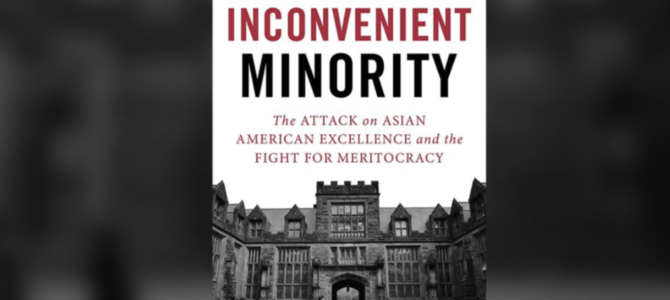
Kenny Xu exposes the truths coastal elites know, but self-servingly ignore. Xu’s new book, “An Inconvenient Minority: The Attack on Asian American Excellence and the Fight For Meritocracy” is a paean to Asian Americans and all they offer to our country and world. Moreover, his book is a reminder that the American dream is as real as it is in need of defense.
As critical race theory infiltrates American society, it penalizes Asian Americans for their strengths. “As Asian Americans continue to be overrepresented in the fields of tech, medicine, and education, antiracist ideology dictates that Asians should be shoved out to make room for minorities considered ‘underrepresented’—in the name of equity,” Xu explains.
In “antiracist educator” Ibram X. Kendi’s vision of America, “Asian American effort and achievement, which buoy them in a country where they do not have social privileges and networks to buffet them, will be suppressed for equity.” As the left’s narrative wins, Asian Americans lose.
Why? Because, you see, Asian Americans are an “inconvenient minority” who threaten everything the left stands to represent. Asian Americans don’t need to be demeaned by racial stereotyping, pity points, or handouts, Xu says. All they need and want is the opportunity to be themselves, unimpeded by a racist “nanny” state. Rather than parrot the left’s narrative of victimhood and racial enmity, Asian Americans consistently work hard, put in the time, and thrive.
That’s exactly why they’re often so successful—and such a threat to today’s CRT propagandists. As the left smears America as irredeemably racist and evil, Asian American excellence is the embodiment of the American dream, proving, once again, that the American promise is alive and well. One of the only barriers to Asian Americans’ unabated success, ironically, is the left’s anti-meritocratic and “antiracist” (but undeniably racist) ideology.
The System Is Rigged, But Victimhood Solves Nothing
When I began reading Xu’s book, I wanted the input of a close friend. She’s Chinese American, and one of the smartest, most hard-working people I’ve ever had the luck of knowing. Right now, she’s a Harvard University undergraduate, studying at one of the world’s preeminent academic institutions because she earned it. Of that, there’s no doubt.
“Do you think Asian Americans have to work harder to get into schools like Harvard?” I asked, suspecting her answer. My friend laughed so much that she started choking — we were at lunch. Obviously, Asian Americans have to work harder. Everyone knows that.
But there was no bitterness in her voice, no passive aggressiveness nor anger. Rather than give up or become consumed with self-pity and racial enmity, my friend humbly explained that she had just worked a little bit harder (translation: she worked a lot harder). Laziness wasn’t an option, and neither was victimhood.
As Xu emphasizes in his book, my friend’s alma mater “practically invented race preferences.” She knew she would be held to higher expectations in the college admissions process. So she chose the honorable way to respond to the system’s unfairness: work harder.
In a court case on track to reach the Supreme Court, litigants argue Harvard openly discriminates against Asian-American applicants. As Xu explains, “[The issue is] that Harvard’s admissions process evaluate[s] people based on their race, and judge[s] it moral to attack Asian Americans for their character and low ‘personality’ in order to prop up lesser qualified applicants of other races.”
Federalist Senior Contributor Helen Raleigh recently noted that data backs this up. “The nonprofit Students for Fair Admissions (SFFA), which brought [the] lawsuit against Harvard, has shown that Asian American applicants had to have SAT scores about 140 points higher than their white peers to be accepted into Harvard,” Raleigh wrote.
Like so many other elite institutions, Harvard penalizes Asian Americans for somehow being “too” good, for being too successful and too qualified. Part of Harvard’s motivations stem from the university’s “clique mentality,” which “allows them to bankroll their $40 billion endowment, to maintain their aura of unattainable prestige,” Xu says. “It allows the people fortunate enough to gain admittance to carry an eliteness that generates their unmerited social respect. It preserves the entitlement an Ivy League degree affords alumni in the world today.”
“And just like any elite clique, Harvard needs someone to pick on, that ‘tryhard’ they laugh at while throwing a big fat rejection in their face,” Xu adds. This clique of bullies targets Asian Americans.
Yet the unfairness and immorality of Harvard’s unmeritocratic admissions criteria didn’t dissuade or embitter my friend. She refused to succumb to the left’s victim narrative, just as she refused to be scared away by Harvard’s tactics. Despite the odds, she got in.
Hard Work and Family Solidarity Pay Off
My friend is unique, but her story is less so. In the face of adversity, Asian Americans have shown, time and again, they still have the motivation and skillset to thrive.
In her review of Xu’s book, Manhattan Institute Fellow Heather Mac Donald might say it best. “Asian American success shows that hard work, self-discipline, and strong families still pay large dividends in the U.S.,” Mac Donald writes.
Education is a large component of this prosperity. According to Xu, “Poor and rich Asians alike study an average of thirteen hours per week, more than twice as much as the typical non-Hispanic white student who studies a mere 5.5 hours per week at home.” The Asian American community prioritizes academic success, pursues it with dedication, and often qualifies its members to study at the country’s most elite institutions and fill prestigious jobs.
Asian Americans pursue such excellence while benefiting from strong family support. Xu reports, “Asian American children are less than half as likely to be living in a household that is not two-parent than the average American,” meaning they benefit from intact family units, which teach future generations the values of hard work and strong parenting.
Despite recent history’s institutionalized discrimination toward, and punishment of, Asian Americans (just remember Japanese internment), Asian Americans have embraced key ingredients to success. As Xu explains, by the mid-twentieth century, Asian Americans “started businesses. They went into every industry. They built the American dream for themselves.”
This Fight Is For All of Us
Asian Americans prove the American dream is still breathing. Moreover, the story of Asian American success illustrates that, insofar as our country rewards merit, this dream is accessible to all Americans. As Xu emphasizes, “your race should not define you in an America that truly lives up to its ideals.”
The traditional American promise is simple: if you have the grit and the drive to work hard, and you do, then you will be successful. You will make it to greener pastures. And it’s not a zero-sum game. As you thrive, so too can your neighbors.
CRT instead aims to dismantle America’s meritocracy. It denies the American dream while dividing local communities on racial lines into the oppressor and the oppressed, the villain and the victim.
At “diversity-obsessed” Google, CRT enthusiasts attempt to prop up other minorities, while penalizing Asians—who somehow “[aren’t] considered ‘diverse’ in the progressive tech world.” Similarly, New York City Mayor Bill de Blasio recently attempted, unsuccessfully, to override the meritocracy of his city’s Specialized School programs, in order to replace Asian students with black and Latino students.
The problem with such CRT-inspired endeavors is that they judge individuals based on their race, rather than their merit. “America faces an increasingly aggressive critical race theory complex that threatens everything about our meritocracy. Millions—no, billions—of dollars and our culture of excellence are at stake, if you just claim the proper victim status and sacrifice the proper morals to the racial narrative,” Xu warns.
As a consequence, CRT is inherently dehumanizing. It reduces Americans to their immutable characteristics, enslaving them to the endless pains of race-baiting, tribal warfare, and envy. In so doing, CRT robs Americans of their dignity, and threatens all that makes America great.
Asian Americans know this. From the Harvard admissions lawsuit to the collective rejection of California’s Proposition 16 (which would have imposed anti-Asian affirmative action), Asian Americans are fighting back. I can only hope that others continue to join them.
After all, Xu’s book highlights the perspectives of Asian Americans, but his argument is for all of us. It’s for all Americans who wish to live in a world where a hardworking nobody, with a lot of time, talent, and dedication, can become somebody. That’s a country worth fighting to maintain.









